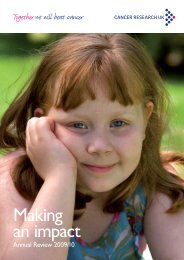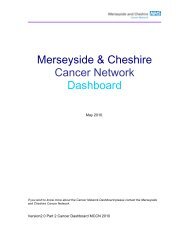Annual Report and Accounts 2010/11 - Cancer Research UK
Annual Report and Accounts 2010/11 - Cancer Research UK
Annual Report and Accounts 2010/11 - Cancer Research UK
- No tags were found...
You also want an ePaper? Increase the reach of your titles
YUMPU automatically turns print PDFs into web optimized ePapers that Google loves.
Our life-saving research<br />
(continued)<br />
Progress against the objectives we set last year – <strong>2010</strong>/<strong>11</strong><br />
Continue to enhance<br />
research programmes<br />
in early diagnosis, screening<br />
<strong>and</strong> prevention.<br />
In April <strong>2010</strong> we reported a major<br />
research breakthrough in the diagnosis<br />
of bowel cancer. A16-year study that we<br />
helped to fund showed that having a<br />
one-off screening test, called flexible<br />
sigmoidoscopy (flexi sig), could cut the<br />
number of cases of bowel cancer by a<br />
third. The test could also reduce deaths<br />
from the disease by 43% among those<br />
attending screening. Flexi sig scans the<br />
bowel for growths called polyps <strong>and</strong><br />
removes them. If left untreated, these<br />
growths can become cancerous.<br />
In October <strong>2010</strong> the <strong>UK</strong> government<br />
announced plans to introduce flexi sig<br />
into Engl<strong>and</strong>’s bowel screening<br />
programme. And in March 20<strong>11</strong> the <strong>UK</strong><br />
National Screening Committee gave the<br />
go-ahead for the test to be introduced<br />
into existing bowel cancer screening<br />
programmes. We’re pushing Wales,<br />
Scotl<strong>and</strong> <strong>and</strong> Northern Irel<strong>and</strong> to follow<br />
Engl<strong>and</strong>’s example.<br />
We funded ten research projects as part<br />
of the National Awareness <strong>and</strong> Early<br />
Diagnosis Initiative (NAEDI). These<br />
include raising public awareness of the<br />
symptoms of cancer <strong>and</strong> the importance<br />
of reporting these promptly to GPs, how<br />
health services can respond promptly <strong>and</strong><br />
appropriately when patients go to their<br />
GP with cancer symptoms, <strong>and</strong> studying<br />
the triggers <strong>and</strong> behaviours that influence<br />
whether people take part in screening.<br />
Our research showed that removing<br />
displays of tobacco at tills helps change<br />
young people’s attitudes towards<br />
smoking. Following our campaigning,<br />
the <strong>UK</strong> government confirmed legislation<br />
will be introduced to prevent shops from<br />
displaying tobacco products.<br />
We continue to co-fund the National<br />
Prevention <strong>Research</strong> Initiative (NPRI),<br />
which has contributed £23 million to<br />
55 research projects that aim to prevent<br />
cancer <strong>and</strong> other chronic diseases by<br />
influencing the lifestyle <strong>and</strong> health choices<br />
people make. We have committed<br />
£1.5 million over five years to fund the<br />
next phase of NPRI, which will develop<br />
<strong>and</strong> test ways to help people alter<br />
lifestyle behaviours, including quitting<br />
smoking or losing weight.<br />
Promote clinical <strong>and</strong><br />
translational research that<br />
will maximise cancer survival.<br />
We support more than 340 research<br />
projects focusing on ‘bench-to-bedside’<br />
studies into new ways to detect <strong>and</strong> treat<br />
cancer. This includes around 200 <strong>UK</strong><br />
clinical trials. The number of cancer<br />
patients taking part in clinical studies in<br />
the <strong>UK</strong> has quadrupled in the last decade.<br />
42,000 cancer patients join<br />
publicly-funded trials each<br />
year. Three-quarters<br />
of those are taking part<br />
in a trial supported by<br />
<strong>Cancer</strong> <strong>Research</strong> <strong>UK</strong>.<br />
Support for long-term clinical research is<br />
crucial. For example, it took ten years for<br />
a follow-up study led by one of our<br />
scientists to prove the long-term benefit<br />
of anastrozole, which is fast becoming<br />
the ‘gold st<strong>and</strong>ard’ drug for preventing<br />
the return of breast cancer. Another trial<br />
for the drug abiraterone – discovered<br />
<strong>and</strong> developed by our scientists –<br />
showed that it can significantly improve<br />
survival rates for men with advanced<br />
prostate cancer.<br />
In our five-year strategy, we committed<br />
to boost research into radiotherapy.<br />
Since 2007 we have supported over<br />
30 early-phase trials into radiotherapy<br />
treatments through our Experimental<br />
<strong>Cancer</strong> Medicine Centres (ECMCs).<br />
We have also supported five new larger<br />
trials aimed at improving radiotherapy.<br />
Surgery continues to be one of the most<br />
important approaches to treating <strong>and</strong><br />
managing cancer <strong>and</strong> is another focus of<br />
our five-year strategy. We aim to<br />
increase research into surgery <strong>and</strong> in<br />
September <strong>2010</strong> we launched a new<br />
scheme that funds cancer surgeons to<br />
develop novel research programmes<br />
during their surgical training.<br />
Continue to build strategic<br />
partnerships with industry,<br />
<strong>and</strong> continue to invest in <strong>and</strong><br />
foster national <strong>and</strong> international<br />
collaborations to deliver the<br />
best research.<br />
Partnerships <strong>and</strong> collaborations with<br />
industry are essential if we are to deliver<br />
better treatments to patients.<br />
In January <strong>2010</strong> <strong>Cancer</strong> <strong>Research</strong><br />
Technology Ltd (CRT), our technology<br />
development <strong>and</strong> commercialisation<br />
arm, signed a three-year agreement with<br />
AstraZeneca to jointly discover drugs<br />
that work by targeting the metabolism of<br />
cancer cells. Scientists from CRT <strong>and</strong><br />
AstraZeneca are now working on four<br />
drug discovery projects <strong>and</strong> the alliance<br />
continues to progress well.<br />
CRT also signed an agreement with<br />
biotechnology company Cephalon in<br />
March <strong>2010</strong>, to discover new drugs that<br />
work by disrupting a key molecule involved<br />
in cancer, called protein kinase C. Studies<br />
are currently progressing at the CRT<br />
Discovery Laboratories before Cephalon<br />
takes the project for further development.<br />
An alliance with AstraZeneca <strong>and</strong> our<br />
network of ECMCs will see us working<br />
together to test new combinations of<br />
cancer drugs in early clinical trials. The<br />
first study will start in late 20<strong>11</strong> <strong>and</strong> two<br />
further new treatment combinations<br />
have been agreed.<br />
In partnership with biopharmaceutical<br />
company Immatics Biotechnologies, we<br />
launched a trial of a new vaccine for an<br />
aggressive form of brain cancer.<br />
Review our funding<br />
mechanisms to ensure that<br />
we are developing, funding <strong>and</strong><br />
supporting the next generation of<br />
cancer researchers.<br />
We launched an online electronic grants<br />
management system, streamlining<br />
processes <strong>and</strong> making it easier for<br />
researchers to apply for funding <strong>and</strong><br />
manage their grants.<br />
We have a number of fellowship funding<br />
schemes which support talented<br />
researchers at the start of <strong>and</strong> during<br />
their careers. These schemes help us to<br />
develop future leaders in cancer research,<br />
<strong>and</strong> this year we saw a significant rise in<br />
applications across all of our fellowships.<br />
06 / <strong>Annual</strong> <strong>Report</strong> <strong>and</strong> <strong>Accounts</strong> / Our life-saving research




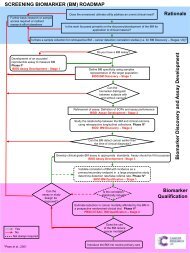
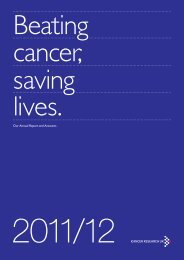
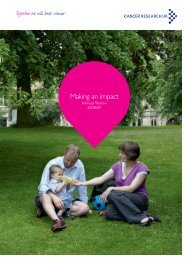
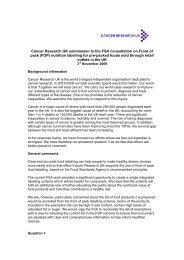
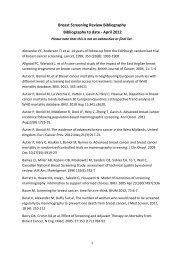
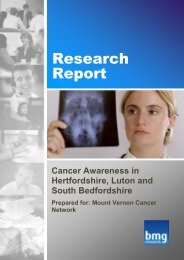
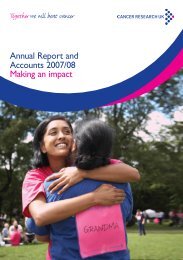
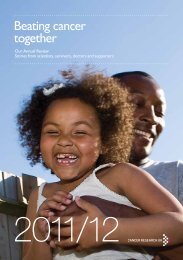

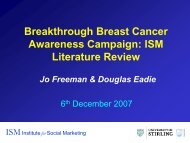
![[PDF] Cancer Research UK's strategy 2009 - 2014](https://img.yumpu.com/29239422/1/184x260/pdf-cancer-research-uks-strategy-2009-2014.jpg?quality=85)
